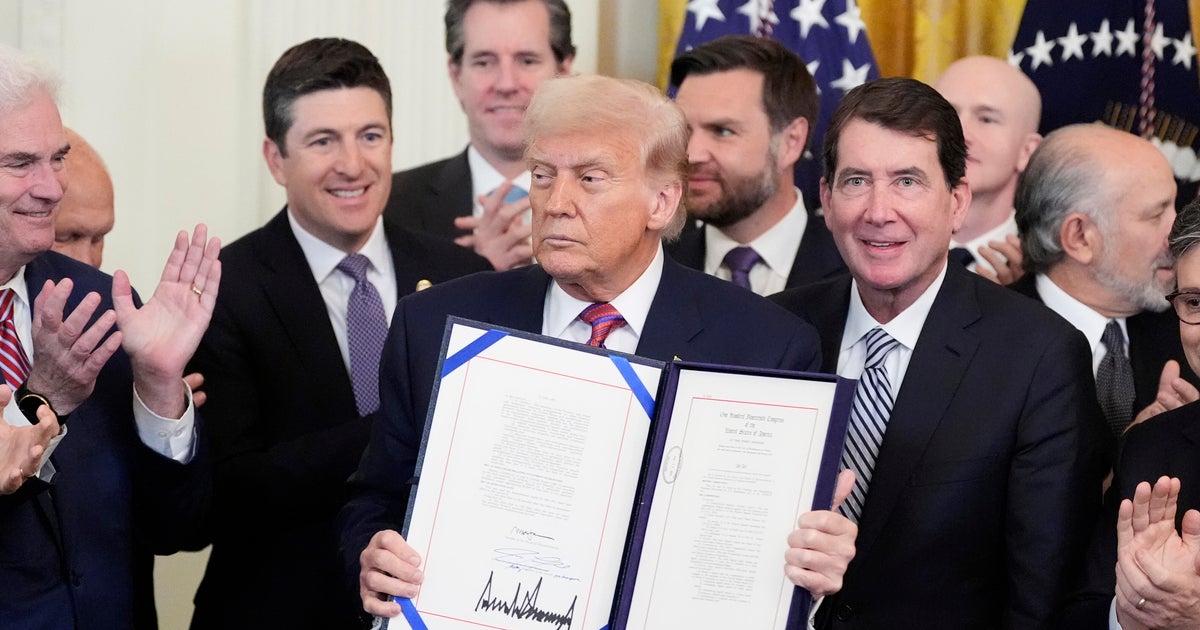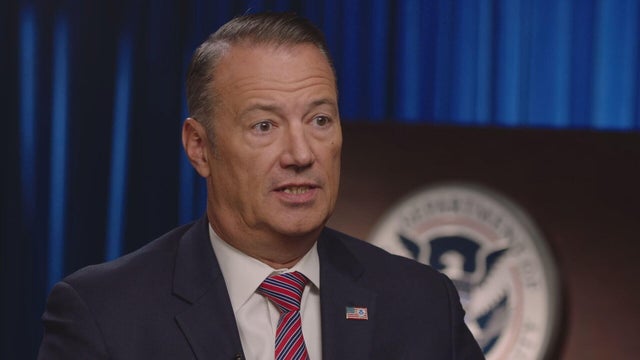

No response returned

Washington — President Trump signed a landmark bill to regulate cryptocurrency on Friday, hailing the "exciting new frontier" for the technology one day after the bill passed the House.
The legislation, called the , is the first major law governing digital currency, and establishes a regulatory framework for the $250 billion stablecoin market. are viewed as a relatively safe type of cryptocurrency since their value is pegged to other assets, like the dollar. The bill passed the House on Thursday with the support of 206 Republicans and 102 Democrats.
"We worked hard. It's a very important act, the GENIUS Act. They named it after me," the president joked in the East Room of the White House. "I want to thank you. This is a hell of an act."
Members of Congress and top executives from Robinhood, Tether, Gemini and other crypto and financial firms were in attendance for the signing ceremony.
The fate of the GENIUS Act was in question earlier this week when a dozen conservatives stymied a procedural vote. A compromise was ultimately reached, and the holdouts allowed the legislation to proceed. The president on Friday suggested that he spoke to the holdouts individually on the phone to persuade them, after House Speaker Mike Johnson told him there were a dozen Republicans opposing the bill.
"The good news is, I call up, 'Hello, Jim, how are you?' 'Sir, you have my vote.' Boom. 'Sir, you have my vote.' I really just, they just want a little love," he said. "Unfortunately, it's always the same 12 people."
David Sacks, the venture capitalist-turned Mr. Trump's AI and crypto czar, said the president "stepped in and saved this bill." Mr. Trump also said Vice President JD Vance had been on the phone late at night, helping push the legislation through.
The GENIUS Act (which stands for Guiding and Establishing National Innovation for U.S. Stablecoins) establishes guardrails and consumer protections for stablecoins. The bill also creates a legal category for stablecoins and establishes clear boundaries for which digital currencies could be referred to as stablecoins.
With the GENIUS Act signed into law, banks, nonbanks and credit unions can dive into the market by issuing their own stablecoins.
Along with being less volatile than other virtual currencies, stablecoins can facilitate faster, lower-cost financial transactions, supporters of the technology say. Before the Senate vote on the Genius Act in June, Sen. Bill Hagerty of Tennessee, the bill's sponsor, stablecoins could allow businesses and consumers to settle payments "nearly instantaneously," rather than taking weeks.
"Just as I promised last year, the GENIUS Act creates a clear and simple regulatory framework to establish and unleash the immense promise of dollar-backed stablecoins," Mr. Trump said. "This could be, perhaps, the greatest revolution in financial technology since the birth of the Internet itself. A lot of people are saying that."
The president said the GENIUS Act provides banks and other financial institutions a framework for issuing crypto assets backed "one-for-one" with real U.S. dollars and Treasury bills, "strengthening the dollar" and allowing the entire U.S. financial system to be eligible for a "21st-century upgrade."
Lawmakers also approved two other cryptocurrency bills, capping what Republicans dubbed "Crypto Week" in Congress. The Act will regulate digital commodities beyond stablecoins, and the Surveillance State Act prevents the Federal Reserve from issuing any retail central bank digital currency directly to Americans. The legislation is seen by the Trump administration and the crypto community as a way of bringing digital currency into the mainstream financial system.
"Let me say, the entire crypto community, for years, you were mocked and dismissed and counted out," the president said. "You were counted out as little as a year and a half ago. But this signing is a massive validation."
The Trump family's crypto investments have increased their wealth in recent months as the administration alters its regulatory approach to digital currency. The White House has insisted there is no conflict of interest, and the president's assets are in a trust managed by his children. Key crypto figures who were present Friday, including Cameron and Tyler Winklevoss, backed Mr. Trump's campaign last year.
The president on Friday also touted his decision to pardon , the founder of the internet marketplace Silk Road who was sentenced to life in prison in 2015.
The GENIUS Act wasn't the only bill that had House Republicans wringing their hands this week. The chamber also approved a request from the president to in funding for foreign aid and public broadcasting in a late-night vote, signing off on changes the Senate made to the bill, known as a rescissions package, earlier this week.
Passage of the funding cuts was this week over Democratic efforts to force the release of files related to convicted sex offender . Ultimately, the package passed the House along party lines, with two Republicans joining Democrats to vote against it. The bill claws back about $8 billion for foreign assistance efforts, including by the the U.S. Agency for International Development, and about $1 billion for public radio and television stations. The president is expected to sign it soon.
"REPUBLICANS HAVE TRIED DOING THIS FOR 40 YEARS, AND FAILED….BUT NO MORE," Mr. Trump wrote on Truth Social, referring to cutting funding to the corporation that oversees federal funds for NPR and PBS. "THIS IS BIG!!!"
Friday's signing ceremony for the GENIUS Act took place against the backdrop of increased focus on the Epstein case. On Thursday evening, Mr. Trump ordered Attorney General Pam Bondi to seek the release of grand jury material related to Epstein, a convicted sex offender who died in federal custody in 2019. Mr. Trump has to disclose more information about the case after the Justice Department said no further documents would be released following a review of the evidence.
"Based on the ridiculous amount of publicity given to Jeffrey Epstein, I have asked Attorney General Pam Bondi to produce any and all pertinent Grand Jury testimony, subject to Court approval," the president wrote on . "This SCAM, perpetuated by the Democrats, should end, right now!"
Bondi said the Justice Department is "ready to move the court tomorrow to unseal the grand jury transcripts." A judge will make the final call on whether the material can be made public, and the process could take weeks or months.





